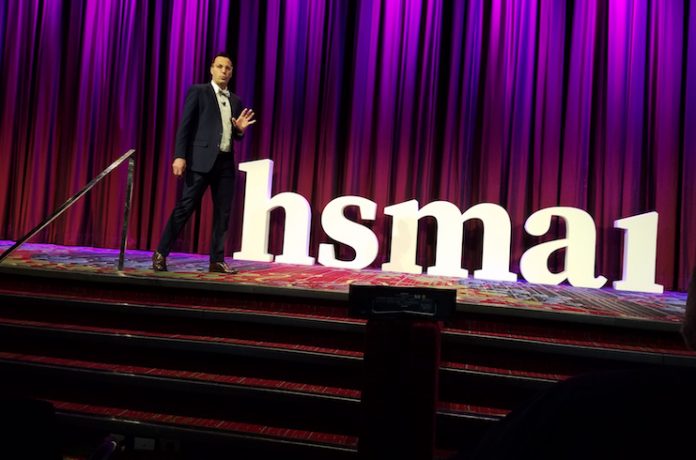
It’s a new year and, while hotel marketers face many of the same recurring issues, 2020 is expected to present both new challenges and opportunities. A day after the Adrian Awards celebrated the top minds in travel marketing, many of those same leaders took the stage on January 22 at the 2020 HSMAI Marketing Strategy conference at the Marriott Marquis New York. Topics ranged from distribution trends to public relations success stories to supplementing brand marketing.
Below, hospitality marketing leaders identify the top issues hotel marketers will face in 2020.
Google’s Push into Distribution
The most prominent distribution partners on the main stage were Expedia and TripAdvisor, both delivering 20-minute presentations on travel e-commerce trends and new features to help hotels drive demand. Only 20 percent of travelers book on the same day they start researching, said Charlie Ballard, global director of strategic insights for TripAdvisor, adding that more than 65 percent of TripAdvisor users are mobile.
The hotel direct vs. OTA debate rages on, with many panelists showing recent commercials from Trivago and Hilton, each poking fun at the other side’s weaknesses. “Trivago, their entire business model is based on bad revenue management,” said Dan Wacksman, principal at Sassato.
Wacksman put much of the blame on the hotel industry for being so fragmented, and that “member rates and secret prices” need better controlled and managed. “If you have three breakfast rates; if you have a Best Available Rate and then three rates that are better than that, that’s on us,” he said, adding that hotel marketers should focus on “lean consumption,” or trying to make things easy. “If we don’t make it easy someone else will,” he said.
Google filled a breakout session and continues to fit its way into the travel marketing space. Tony Schirripa, head of Google Travel Ads, reviewed how Google’s offerings are evolving and pitched “disrupting” the traditional attribution model by better understanding that travel planning is not linear. He said 74 percent of travelers re-research even after booking, and that 1 in 10 actually rebook. “How can we improve the travel journey by identifying the right moments and connect with travelers in the right context and with the right content?” he asked.
Schirripa said Google is working on bringing together multi-session journeys across flight, hotel, and experience. Travelers start with knowing where they want to go and when they want to go, and then decide where to stay, he said. The search giant is experimenting with more “personal results,” such as serving up hotels and details related to previous search queries.
“We are actively working to improve the traveler experience,” Schirripa said, through products like customized Google Hotel Ads, which he dubbed Google’s “metasearch” platform, and Google My Business, which helps hoteliers serve up the right content at the moment of booking and is the fastest way to push content live on Google, he said.
PR Gets a Platform
For the first time, the HSMAI Marketing Strategy conference dedicated a breakout session to public relations, which has recently evolved into integrated communications, titled “Substance over Style.”
Leaders discussed the importance of creating a narrative and then implementing a more holistic PR strategy rather than scrambling to put something together. “While prior it was segregated and everyone had their own specialty, our clients are wanting a more integrated approach that starts with a conversation,” said Sarah Evans, partner at J Public Relations.
The conversation quickly turned to the hot new marketing channel—travel influencers—and how the space is evolving. Influencer marketing is becoming more transactional, and Instagram’s move to disengage “likes” could push marketers to spend more with the company directly rather than through influencers, panelists agreed. “You can latch onto a few [influencers] that really fit the right audience,” Evans said. “Before we paid a photographer $25,000; now we barter for an overnight stay.”
All panelists agreed that they don’t pay influencers. Instead, they trade for experiences and come up with specific asks. “The pitch really outlines the vision—what we want to see,” Evans said. “While we want them to do what they’re good at, we are very diligent in explaining the deliverables.”
Capitalize on Brand Marketing
Stephanie Smith, founder of Cogwheel Marketing, dug into the weeds of what marketing tools hoteliers get from three of the top franchisors—Hilton, Marriott, and IHG. She suggested tapping into the resources made available by brands, adding, “If you do nothing else the brand will do a pretty good job for you. However, it’s also critical to know your brand’s unique selling propositions and your property’s unique demand generators and use that to shape content and imagery.”
Smith stressed the importance of reviews, saying they account for more than 15 percent of how Google ranks a business, and even suggests hoteliers ask and answer their own questions on review sites, which can be as simple as, “Are you pet-friendly hotel?” with the answer, “Yes, we’re a pet-friendly hotel.”
Other quick tips were to evaluate competitors’ backlinks and determine whether there’s an opportunity to steal share, and ensure the property has images for each room type.
The Robots are Coming
Kelly McGuire, principal at McRevenue, discussed the rapid transformation of analytics, artificial intelligence, and machine learning during the HSMAI Marketing Strategy conference. McGuire explained that while travel marketers have had the data for a while, they now finally have the computing power to find and replicate tasks where each automation is slightly different, allowing the machine to “learn.”
When exploring how analytics can help marketers make smarter business decisions, McGuire suggested asking the right questions upfront—being proactive instead of reactive—and putting together a cross-functional team to start looking at the data.











